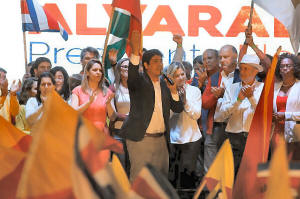|
A
former minister and fiction writer, Quesada, 38, had 61 percent
of the vote with results in from 95 percent of polling stations,
a far bigger lead than predicted by opinion polls that foresaw a
tight race.
"My commitment is to a government for everybody, in equality and
liberty for a more prosperous future," he told thousands of
cheering supporters blowing horns and waving Costa Rica's red,
white and blue flag.
"There is much more that unites us than divides us."
His rival, Alvarado Munoz, a 43-year-old former TV journalist
known for religious dance songs, quickly conceded, sinking to
his knees, arms raised, in front of supporters, some of them
crying.
"We didn't win the election," he said, adding that he had
congratulated his opponent in a telephone call and, in another
sign of Costa Rica's cordial politics, promised to help him
resolve the country's problems.
The election had exposed divisions in the Central American
tourist destination known for laid-back beach culture and
pristine rainforests, but where some rural communities remain
socially conservative.
It could also reflect the mood elsewhere in Latin America, where
elections are being held this year in several countries that
have backed same sex unions, provoking a conservative reaction.
Alvarado Quesada, until recently a minister in the outgoing
government, will be the youngest president in the modern history
of Costa Rica when he takes office in May.
Also known for his student prog-rock band, he used the campaign
to appeal to his country's centrist streak. His vice
presidential candidate, Epsy Campbell, will be the country's
first Afro-Costa Rican to serve in that role.
Opponent Alvarado Munoz had vowed to restore what he called
traditional values by preventing gay marriage and restricting
women's access to abortions.
The two men took opposing positions on a January decision by the
Inter-American Court of Human Rights, an influential regional
body based in San Jose.
Fabricio, as supporters refer to Alvarado Munoz, called the
ruling an affront to sovereignty. Threatening to remove the
country from the court's jurisdiction, he shot from the margins
to win the first round of voting in February.
Quesada, by contrast, backed the court's ruling. In the
campaign's final debate, he called his opponent's comments
homophobic.
(Reporting by David Alire Garcia and Enrique Andres Pretel;
Editing by Frank Jack Daniel and Clarence Fernandez)
[© 2018 Thomson Reuters. All rights
reserved.] Copyright 2018 Reuters. All rights reserved. This material may not be published,
broadcast, rewritten or redistributed.
Thompson Reuters is solely responsible for this content.

|
|







